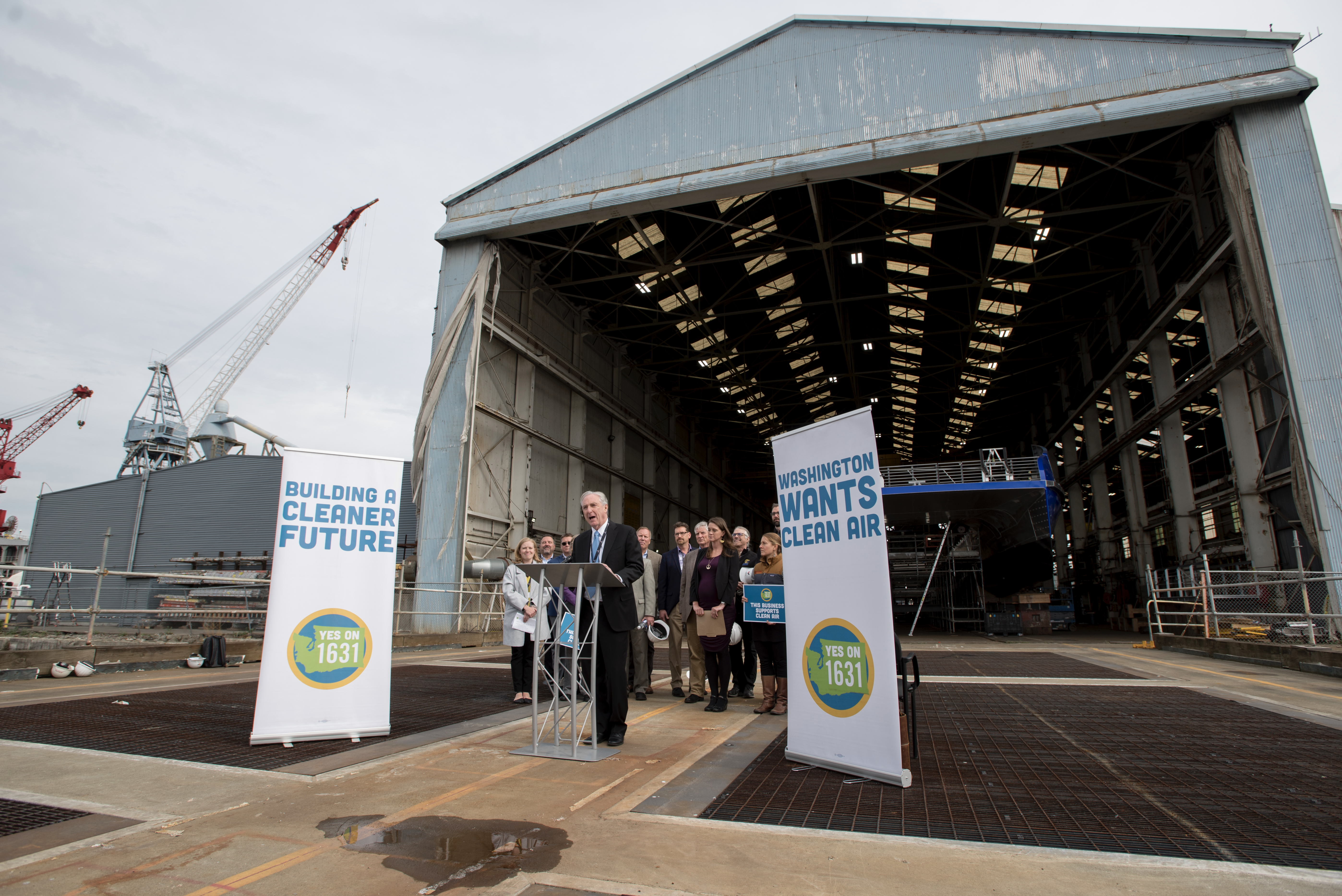Leadership
 Virginia Mason chairman and CEO Gary S. Kaplan, M.D. speaks in support of carbon pricing
Virginia Mason chairman and CEO Gary S. Kaplan, M.D. speaks in support of carbon pricing
in Washington state. (Yes on 1631 campaign)
The challenge
Hospitals and health professionals serve on the front lines of climate change, bearing the cost of more frequent extreme weather events and changing disease burdens. Public investments in infrastructure and preparedness affect the ability of a hospital to be “climate ready.” Hospitals and health systems are large purchasers of energy, so their financial viability – as well as the cost of patient care – is impacted by local and state energy policy.
Hospitals and health systems have a direct stake in climate solutions and clean energy policies and must be at the table when these important decisions are made. As valued anchor institutions, hospitals are also essential partners for advancing mitigation and climate resilience strategies in the communities they serve.
Our vision
In addition to reducing emissions from their own operations, hospitals can protect patients and communities from the health impacts of climate change by advocating for local, state, and national policies that support a sustainable future. The health sector can leverage its purchasing power to accelerate the transition to a low-carbon, climate-resilient economy.
Making health and health care integral to climate policymaking at all levels and across all sectors offers a major opportunity to strengthen support for climate action, advance climate solutions, and achieve ambitious health targets through win-win strategies that promote climate justice and health equity.
“Given the size and scope of the health care sector in the U.S. and globally, health care climate leadership has to the opportunity to play a major role in mitigating the coming changes.”
- Gary Cohen, president and co-founder of Health Care Without Harm,
and Kate Walsh, Boston Medical Center, president and CEO in Modern Healthcare.
Our work
As the only sector with a healing mission, hospitals and health systems bring a unique moral credibility to the public conversation about climate change and clean energy. As trusted messengers, health care professionals have the ability to reframe climate change as a threat to human health. Together, hospitals and health care professionals can be powerful advocates for climate-smart policies.
Health Care Without Harm works with valued partners including health systems, clinicians, other nonprofits, government agencies, and businesses to support leadership on climate and health. Along with our partners, we work to inspire the health care sector to use its voice to establish a public understanding of climate change as a health threat that must be addressed.
Our U.S. Health Care Climate Council brings the voice of the health care sector into city halls and state houses across the country, communicating the urgency of climate change to our nation’s leaders. Council members also educate their staff, patients, and communities about the health threats posed by a changing climate.
In the summer of 2018, Health Care Without Harm helped launch a new “health pillar” of We Are Still In, bringing an initial 19 health systems into the cross-sectoral coalition. By signing the We Are Still in pledge, hospitals join mayors, county executives, governors, tribal leaders, college and university leaders, businesses, faith groups, and investors to meet the goals set by the Paris Agreement.
Our health care climate alliances in California, Massachusetts, and Washington bring expertise, experience, and trusted voices to the legislative and regulatory process for climate-smart policies related to energy, transportation, food, waste, infrastructure, and community resilience.
Health Care Without Harm advances health profesional leadership through our Physician Network, which supports physician leaders in leveraging their influence and expertise to advance climate-smart health care, and through the Nurses Climate Challenge, a national campaign mobilizing nurses to educate health professionals on the health impacts of climate change.
Take action
The health sector should lead the movement for a sustainable future for people and the planet. Hospitals and health systems can commit to educating staff and the public about climate and health and promoting policies to protect public health from climate change by joining the Health Care Climate Challenge. Hospitals and health systems also have the option to sign the We Are Still In pledge when they join the Challenge.
The call to action on climate and health outlines a set of ten priority policy actions for health leadership on global climate and health goals. We invite health systems and organizations to endorse the call to action and share the policy roadmap with your representatives.
Health professionals can take action by joining our Physician Network or the Nurses Climate Challenge.
Health Care Without Harm’s Physician Network supports emerging and established physician leaders in leveraging their influence and expertise to advance the growing health care sustainability movement and to create climate-smart health care.
The Nurses Climate Challenge is a national campaign to mobilize nurses to educate health professionals on the impacts of climate change on human health. Together with other Nurse Climate Champions from across the country, you have the power to launch a movement of health professionals committed to taking action to protect the health of their patients and communities from the worst impacts of climate change.
Health professionals are encouraged to join or start a state-based climate action group. The Medical Society Consortium on Climate and Health lists contact information for local groups.
Tools and resources
- Alliance of Nurses for Healthy Environments
- Medical Society Consortium for Climate and Health
- U.S. Climate and Health Alliance
- How to talk about climate change for health professionals
- Climate action playbook
- Energy and Health Impact Calculator
- Health care and climate change: An opportunity for transformative leadership
- Climate Changes Health posters
- Climate and health patient education
Contact information
We want to hear from you! For more information, please contact us at climate@hcwh.org.



